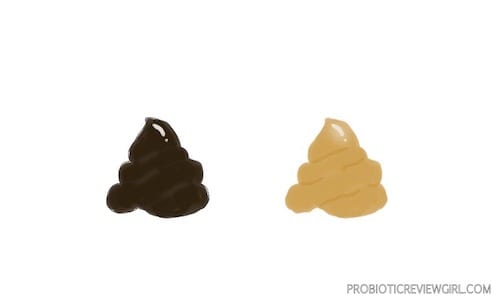Can Probiotics Change Stool Color?
In this blog post I will share a study that shows one probiotic strain can 100% make your stool a darker brown according to one Japanese study.
There are currently no clinical studies that prove probiotics can change an adult stool to a yellow or green but they can for baby poop.
If your stool has changed color after taking probiotics recently this guide will help clear some basic things up.
Can Probiotics Make Your Stool Darker?

Color's your stool can change.
The only study I could find mentioning stool color and probiotics was this 2015 Japanese one testing the function and gut environment effects of Lactobacillus gasseri CP2305 probiotic bacteria.
The research didn't actually set out to initially test the probiotic effects on stool color but it was however a question added in the the participants questionnaire form. 118 Japanese adults answer question related to their stool color over the course of 3-weeks whilst taking the L. Gasseri 10-Billion CFU daily via a probiotic drink.
When comparing the stool colors with a placebo group it was clear to see in this graphic that as the 3-weeks progressed the stool colors got steadily darker in the probiotic group. The stool color remained brown in the control group.
Yes, Probiotics can make your stool darker.
This study proved that yes, probiotics like Lactobacillus Gasseri can indeed make your stool darker but only after 2-3 weeks and not instantly. It's also possible that different probiotic strains could have varying effects on stool color.
Yellow Stool After Probiotics
Probiotics typically do not cause a yellow stool and the color of your stool can be influenced by several factors such as your diet, medications, and underlying medical conditions. There are no reports of anyone having a yellow stool after taking probiotic supplements.
One possible cause of a yellow stool is Celiac disease, which is an autoimmune disorder that affects the small intestine's ability to digest gluten. Another possible cause could be lactose intolerance, which occurs when your body is unable to break down lactose, a sugar found in dairy products.
Eating yellow-colored foods like carrots, sweet potatoes, and yellow bell peppers can also temporarily turn your stool yellow. If you experience persistent yellow stools or other concerning symptoms, it's important to speak with a healthcare provider to determine the underlying cause and appropriate treatment.
Green Stool After Probiotics
While probiotics may affect stool color and consistency, there are no studies that specifically link probiotics to green stool and I could find any user reports on websites like Reddit either. Other factors that can cause green stool include:
Changes In Baby Poop Color
This 2019 study I found, suggests that probiotics can change the color of a baby's stool. Specifically, the study found that the number of infants with mustard yellow-colored feces increased after taking probiotics (from 22 to 40).
It's worth noting that the study did not find statistically significant results in this regard, but it does suggest that there was a noticeable change in stool color after taking probiotics. Always consult with your Doctor if you notice any changes in your babies poop.
Closing Thoughts
To sum up everything I wrote, probiotics may have an impact on the color and consistency of your stool but it's important to understand that various factors can contribute to changes in stool color. While probiotics have been found to make stools darker in one study I found, they typically do not cause yellow or green stools.
If you experience persistent changes in stool color or any concerning symptoms, it's important to speak with a healthcare provider to determine the underlying cause and appropriate treatment. As with any health concern, consulting with a medical professional is always recommended especially if symptoms persists. I am not a doctor.

Alicia Harper is a NASM-CNC Certified nutritionist and the editor of ProbioticReviewGirl.
After suffering from recurrent gut issues she spent years researching Probiotics and the microbiome.
She has tested 29+ different Probiotics and is a probiotics expert. As a probiotic fanatic, she has valuable knowledge to share with the world.